- Home
- Margaret Atwood
Stone Mattress: Nine Tales Page 4
Stone Mattress: Nine Tales Read online
Page 4
She’s just opening up the Alphinland file folder on her screen to consult the list of gods when Ewan’s voice says, right in her ear and very loudly, “Turn it off!”
She jumps. “What?” she says. “Turn what off?” Has she left the burner on under the kettle again? But she hasn’t made the hot drink!
“Turn it off! Alphinland! Turn it off now!” he says.
He must mean the computer. Shaken, she looks over her shoulder – he was right there! Then she clicks the Shut Down button. Just as the screen darkens, there’s a heavy, dull thud, and the lights go off.
All the lights. The streetlights too. How did he know in advance? Does Ewan have prophetic vision? He never used to.
She gropes her way down the stairs and along the hall to the front door, opens it cautiously: to the right, a block along, there’s a yellow glow. A tree must have fallen across a hydro line and pulled it down. Heaven only knows when they’ll be around to fix it: this outage must be one of thousands.
Where did she leave the flashlight? It’s in her purse, which is in the kitchen. She shuffles and gropes her way along the hall, fumbles in her purse. Not much juice left in the flashlight batteries, but enough so she manages to get the two candles lit.
“Turn the water off at the mains,” says Ewan. “You know where that is, I showed you. Then open the faucet in the kitchen. You need to drain the system, you don’t want the pipes to burst.” This is the longest speech he’s made for a while. It gives her a warm, fuzzy feeling: he’s genuinely worried about her.
Once she’s accomplished the faucet quest, she assembles a collection of insulating items – the duvet from the bed, a pillow, some clean wool socks, and the plaid car rug, and makes a nest in front of the fireplace. Then she gets the fire going. As a precaution, she pulls the fire screen across in front of it: she wouldn’t want to go up in flames during the night. There isn’t enough wood for a whole day, but there’s enough to get her through until dawn without freezing to death. It will surely take hours for the house to cool down. In the morning she’ll think about alternatives; perhaps by then the storm will have blown past. She snuffs out the candles: no sense in setting herself alight.
She curls up inside the duvet. In the fireplace the flames flicker. It’s surprisingly cozy, at least for now.
“Well done,” says Ewan. “That’s my gal!”
“Oh Ewan,” says Constance. “Am I your gal? Was I always? Were you having an affair, that time?”
No answer.
The trail of ashes leads through the woods, glimmering in the moonlight, the starlight. What has she forgotten? There’s something wrong. She comes out from under the trees: she’s on an icy street. It’s the street where she lives, where she’s lived for decades, and there’s her house, the house where she lives with Ewan.
It shouldn’t be here, in Alphinland. It’s in the wrong place. All of it is wrong, but she follows the trail of ashes anyway, up the front steps and in through the door. Sleeves wrap around her, sleeves of black cloth. A trench coat. It isn’t Ewan. There’s a mouth, pressing against her neck. There’s a long-lost taste. She’s so tired, she’s losing power; she can feel it draining away from her, out through the ends of her fingers. How did Gavin get in here? Why is he dressed like an undertaker? With a sigh she melts into his arms; wordlessly she falls back onto the floor.
Morning light wakes her, streaming in through the window with its extra pane of ice. The fire has gone out. She’s stiff from sleeping on the floor.
What a night. Who would have thought she was capable of having such an intense erotic dream, at her age? And with Gavin: how idiotic. She doesn’t even respect him. How did he manage to work his way out of the metaphor she’s kept him bottled up in for all these years?
She opens the front door, peers outside. The sun is shining, the eaves are growing bright icicles. The kitty litter on her steps is a mess; as things melt, it will turn to damp clay. The street is a shambles: branches everywhere, ice at least two inches thick. It’s glorious.
But the inside of the house is cold, and getting colder. She’ll have to go out into all that dazzling space to buy more wood, if there is any. Or else she could find a shelter of some sort: a church, a coffee shop, a restaurant. Some place that still has power and heat.
That would mean leaving Ewan. He’d be alone here. That wouldn’t be a good thing.
For breakfast she has vanilla yogourt, spooning it straight from the container. While she’s eating it, Ewan announces himself. “Pull yourself together,” he says, quite sternly.
She fails to grasp his point. She doesn’t need to pull herself together. She’s not dithering, she’s only eating yogourt. “What do you mean, Ewan?” she says.
“Didn’t we have good times?” he says, almost pleading. “Why are you ruining it? Who was that man?” Now his voice sounds hostile.
“Who do you mean?” she says. She has a bad feeling. It can’t be possible that Ewan has access to her dreams.
Constance, she tells herself. You’re out of control. Why wouldn’t he have access to your dreams? He’s only inside your head!
“You know,” says Ewan. His voice comes from behind her. “That man!”
“I don’t think you have any right to ask,” she says, turning around. No one there.
“Why not?” says Ewan, more faintly. “Pull yourself together!” Is he fading?
“Ewan, did you have an affair?” she asks. If he really wants to get into it, two can play.
“Don’t change the subject,” he says. “Didn’t we have good times?” There’s a tinny quality to the voice now: something mechanical.
“You’re the one who was always changing the subject,” she says. “Just tell me the truth! You have nothing to lose any more, you’re dead.”
She shouldn’t have said that. She’s gone about this all wrong, she ought to have reassured him. She shouldn’t have said that word, it slipped out because she was angry. “I didn’t mean it!” she says. “Ewan, I’m sorry, you’re not really …”
Too late. There’s a tiny, barely audible explosion, like a puff of air. Then silence: Ewan is gone.
She waits: nothing. “Stop sulking!” she says. “Just snap out of it!” She’s briefly angry.
She goes out for food. On one of the sidewalks, a thoughtful soul has laid down sand. The corner store, miraculously, is open: they have a generator. There are other people in there, bundled and swaddled: they’ve lost their power too. The woman with the dyed hair and the tattoo has plugged in a crock pot and heated up some soup. She’s selling the barbecued chickens, cut up into pieces so there will be enough to go around. “There you are, dear,” she says to Constance. “I was worried about you!”
“Thank you,” says Constance.
She warms up, eats chicken and soup, hears ice-storm stories from the others. Narrow escapes, frights, quick thinking. They tell one another how lucky they are, ask one another if there’s any way they can help. It’s companionable here, it’s friendly, but Constance can’t stay long. She needs to go back to the house, because Ewan must be waiting.
Once there she creeps from one cold room to another, calling softly as if to a frightened cat: “Ewan, come back! I love you!” Her own voice echoes in her head. Finally she climbs the stairs to the attic and opens the trunk with the mothballs. It’s only clothes. They lie there, flattened, inert. Wherever else Ewan is, he’s not here.
She was always afraid to push that question before, the question of the affair. She wasn’t an idiot, she knew what he was doing, though not who with: she could smell it on him. But she was terrified that Ewan might leave her the way Gavin had. She couldn’t have survived that.
And now he has left her. He’s gone silent. He’s gone.
But though he’s gone from the house, he can’t be gone from the universe, not altogether. She won’t accept that. He must be somewhere.
She needs to concentrate.
She goes into the study, sits in Ewan’s chair, stares at t
he blank screen of her computer. Ewan must have wanted to save Alphinland; he didn’t want it to be fried by an electrical spasm. That was why he ordered her to shut down the computer. But what was his reason for doing that? Alphinland isn’t his territory: secretly he hated its fame, he thought it was silly, he was humiliated by its intellectual shallowness. He resented her deep immersion in it, even while indulging her about it. And he was excluded from it, from her private world: invisible bars keep him out. They’ve always kept him out, ever since they met. He can’t go in there.
Or can he? Maybe he can. Maybe the rules of Alphinland no longer hold, because the hexed ashes have done their work and the ancient charms are broken. That’s why Gavin was able to pop open the lid of his cask last night and turn up in Constance’s house. And if Gavin can get out of Alphinland, it stands to reason that Ewan can get in. Or could get drawn in, if only by the lure of the forbidden.
That must be where he’s gone. He’s passed through the gateway in the turreted stone wall, he’s in there now. He’s following the dim, winding road, he’s crossing the moonlit bridge, he’s entering the hushed, precarious wood. Soon he’ll reach the shadowy crossroads, and then which way will he turn? He’ll have no idea. He’ll get lost.
He’s already lost. He’s a stranger to Alphinland, he doesn’t know its dangers. He’s runeless, he’s weaponless. He has no allies.
Or he has no allies but her. “Wait for me, Ewan,” she says. “Wait right there!” She’ll have to go in and find him.
REVENANT
• • • • • • • • •
Reynolds bustles into the living room, carrying two pillows. An indeterminate number of years ago, those two pillows billowing upward from Rey’s encircling arms like two plump, inflatable breasts, soft but firm, would have suggested to Gavin the real breasts, equally sof–t but firm, that were hidden underneath. He might have hammered together a clever metaphor incorporating, for example, two sacks of feathers, and, by way of them, two sexually receptive chickens. Or possibly – because of the bounciness, the resilience, the rubberiness – two trampolines.
Now, however, these pillows recall – in addition to the breasts – an overdone avant-garde production of Richard the Third they’d seen in a park the previous summer. Reynolds made them go; she said it was good for Gavin to get out of his rut and be in the outdoors and expose himself to new concepts, and Gavin said he would rather just be in the outdoors and expose himself, and Rey nudged him playfully with her elbow and said, “Bad Gavvy!” It was one of her kittenish tropes to pretend that Gavin was a dysfunctional pet. Not so far from the truth, he thinks bitterly: he hasn’t yet taken to crapping on the carpet and destroying the furniture and whining for meals, but close.
On their expedition to the park, Reynolds took a packsack with a plastic sheet to sit on and a couple of car rugs in case Gavin got chilled, and two thermoses, one of hot cocoa and one containing vodka martinis. Her plan was transparent: if Gavin complained too much she would dose him with alcohol and cover him up with the car rugs and hope he’d go to sleep so she could immerse herself in the deathless bard.
The plastic sheet was a good idea, as it had rained in the afternoon and the grass was damp. Secretly hoping for more rain so he could go home, Gavin settled himself onto the car rug and complained that his knees hurt, and also he was hungry. Reynolds had foreseen both of these areas of disgruntlement: out came the RUB A535, with Antiphlogistene – one of Gavin’s favourite examples of meaningless words – and a salmon salad sandwich. “I can’t read the fucking program,” said Gavin, not that he wanted to. Rey handed him the flashlight, and also a magnifier. She’s up to most of his dodges.
“This is exciting!” she said in her best Miss Sunshine voice. “You’re going to enjoy it!” Gavin had a twinge of remorse: she has such a touching belief in his innate capacity to enjoy himself. He could do it if he tried, she claims: his problem is that he’s too negative. They’ve had this conversation more than once. He’ll reply that his problem is that the world reeks, so why doesn’t she stop trying to fix him and concentrate on that? And she will reply that reekiness is in the nose of the sniffer, or some other exercise in Kantean subjectivism – not that she’d know Kantean subjectivism if she fell over it – and why doesn’t he take up Buddhist meditation?
And Pilates, she’s strongly urging Pilates. She’s already lined up a girl Pilates instructor who’s willing to give him private sessions, contrary to her usual practice, because she admires his work. This idea is dismaying: having some estrogen-plumped babe a quarter of his age contort his stringy, knobbled limbs while comparing the dashing protagonist of his earlier poems, replete with sexual alacrity and sardonic wit, to the atrophied bundle of twine and sticks he has become. Look on this picture, then on this. Why is Reynolds so keen to hook him up to the Pilates torture apparatus and stretch him upon it until he snaps like an outworn rubber band? She wants to know he’s suffering. She wants to humiliate him and feel virtuous about it at the same time.
“Stop trying to pimp me out to all these groupies,” he tells her. “Why don’t you simply rope me into a chair and charge admission?”
The park was pullulating with activity. Kids played Frisbee in the background, babies yowled, dogs barked. Gavin pored over the program notes. Pretentious crap, as usual. The play was late starting: some spasm in the lighting system, they were told. The mosquitoes were gathering; Gavin swatted at them; Reynolds produced the Deep Woods Off. Some fool in a scarlet unitard and pig’s ears blew a trumpet to get them all to shut up, and after a minor explosion and a figure in a ruff sprinting off in the direction of the refreshment kiosk – In search of what? What had they forgotten? – the play began.
There was a prelude showing a film clip of Richard the Third’s skeleton being dug up from underneath a parking lot – an event that had in fact taken place, Gavin saw it on the television news. It was Richard all right, complete with DNA evidence and many injuries to the skull. The prelude was projected onto a piece of white fabric that looked like a bedsheet, and probably was one – arts budgets being what they were, as Gavin commented to Reynolds, sotto voce. Reynolds dug him with her elbow. “Your voice is louder than you think,” she whispered.
The soundtrack led them to understand – over a crackling loudspeaker and in lousy iambic pentameter Elizabethan pastiche – that the entire drama they were about to see was unfolding post-mortem from inside Richard’s battered skull. Zoom to a hole in the skull, and then right on through it to the inside of the cranium. And blackout.
Whereupon the bedsheet was whisked away and there was Richard in the floodlights, all set to caper and posture, to flounce and denounce. On his back was a preposterously large hump, decorated in a jester’s red and yellow stripes – like Mr. Punch, the program notes had explained, who himself was derived from Punchinello; for the director’s vision was that Shakespeare’s Richard was modelled on commedia dell’arte, a troupe of which had been playing in England at the time. The largeness of the hump was deliberate: the inner core of the play (“As opposed to the outer core,” Gavin had snorted to himself) was all about the props. These were symbols of Richard’s unconscious, which accounted for their enlargement. The director’s thinking must have been that if the audience members were staring at outsized thrones and humps and whatnot and wondering what the fuck they were doing in this play, it wouldn’t bother them so much that they couldn’t hear the words.
So in addition to his gigantic, varicoloured, metonymous hump, Richard had a kingly robe with a sixteen-foot-long train attached to it, carried by two pageboys wearing outsized boar’s heads because Richard’s coat of arms had a boar on it. There was a huge butt of malmsey for Clarence to be drowned in, and a couple of swords that were as tall as the actors. For the smothering of the princes in the Tower, performed in dumb show like the play within the play in Hamlet, two enormous pillows were borne in on stretchers like corpses or roasted suckling pigs, with pillowcases that matched the motley of Richard’s hump
, just in case the audience missed the point.
Death by hump, thinks Gavin, eyeing the approaching pillows borne towards him by Reynolds. What a fate. And Reynolds as First Murderer. But that would be fitting, all things considered; and Gavin does consider all things. He’s got the time for it.
“Are you awake?” says Reynolds brightly as she clacks across the floor. She’s wearing a black pullover with a silver and turquoise belt cinched around her waist and tight jeans. She’s getting a little flubber on the outsides of her thighs, which otherwise have the heft and contours of a speed skater’s. Should he point out those pockets of flubber? No; better to hold them back for a more strategic moment. And maybe it isn’t flubber, maybe it’s muscle. She works out enough.
“If I wasn’t awake before, I would be now,” says Gavin. “You sound like a wooden railroad.” He dislikes those clogs, and he’s told her so. They do nothing for her legs. But she doesn’t care what he thinks about her legs as much as she used to. She says the clogs are comfortable, and that comfort trumps fashion as far as she’s concerned. Gavin has tried quoting Yeats to the effect that women must labour to be beautiful, but Reynolds – who used to be a passionate Yeats fan – is now of the opinion that Yeats is entitled to his point of view, but that was then and social attitudes were different, and in actual fact Yeats is dead.
Reynolds tucks the pillows in behind Gavin, one behind his head, one at the small of his back. This pillow arrangement, she claims, makes him look taller and therefore more impressive. She straightens the plaid car rug that covers his legs and feet, and which she insists on calling his nap blanket. “Oh, Mr. Grumpy!” she says. “Where’s your smile?”

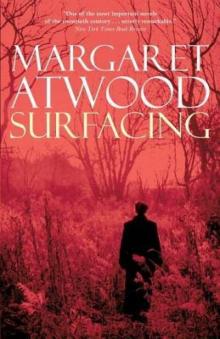 Surfacing
Surfacing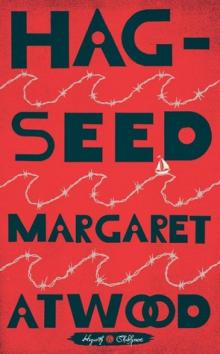 Hag-Seed
Hag-Seed Oryx and Crake
Oryx and Crake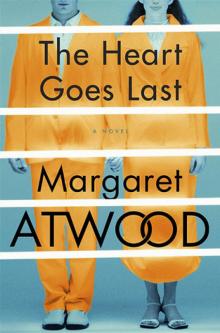 The Heart Goes Last
The Heart Goes Last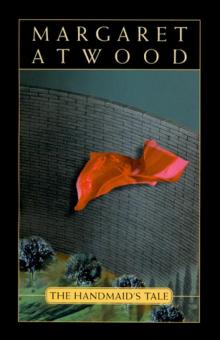 The Handmaid's Tale
The Handmaid's Tale Lady Oracle
Lady Oracle Good Bones and Simple Murders
Good Bones and Simple Murders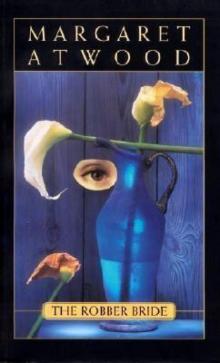 The Robber Bride
The Robber Bride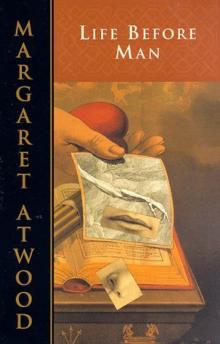 Life Before Man
Life Before Man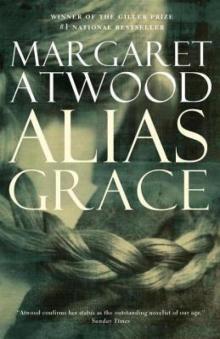 Alias Grace
Alias Grace The Blind Assassin
The Blind Assassin Cat's Eye
Cat's Eye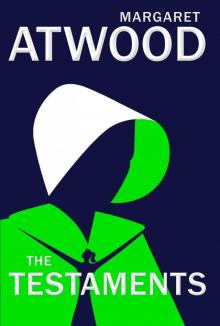 The Testaments
The Testaments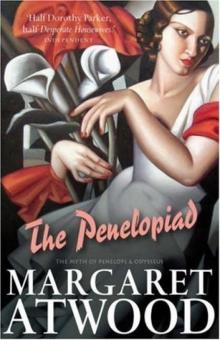 The Penelopiad
The Penelopiad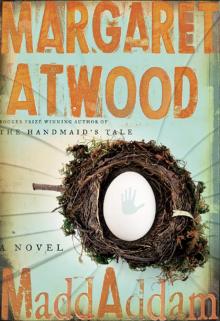 MaddAddam
MaddAddam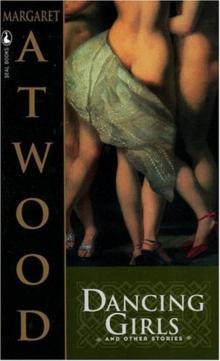 Dancing Girls & Other Stories
Dancing Girls & Other Stories On Writers and Writing
On Writers and Writing Selected Poems II (1976-1986)
Selected Poems II (1976-1986) Wilderness Tips
Wilderness Tips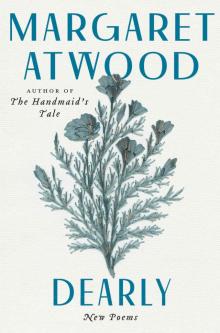 Dearly
Dearly The Tent
The Tent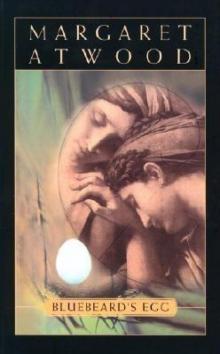 Bluebeard's Egg
Bluebeard's Egg The Edible Woman
The Edible Woman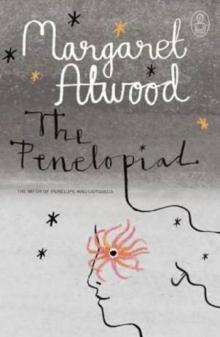 The Penelopiad: The Myth of Penelope and Odysseus
The Penelopiad: The Myth of Penelope and Odysseus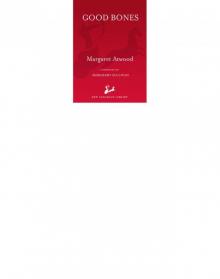 Good Bones
Good Bones I Dream of Zenia with the Bright Red Teeth
I Dream of Zenia with the Bright Red Teeth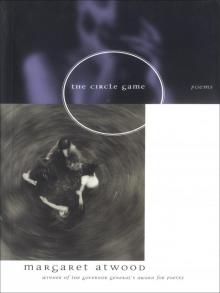 Circle Game
Circle Game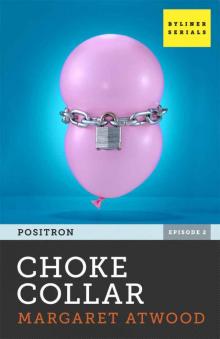 Choke Collar: Positron, Episode Two
Choke Collar: Positron, Episode Two Stone Mattress: Nine Tales
Stone Mattress: Nine Tales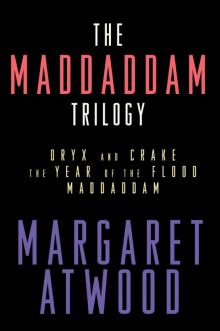 The MaddAddam Trilogy
The MaddAddam Trilogy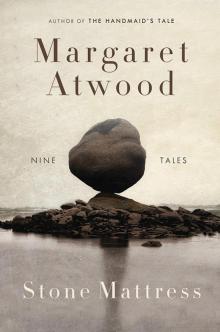 Stone Mattress
Stone Mattress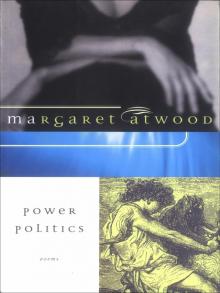 Power Politics
Power Politics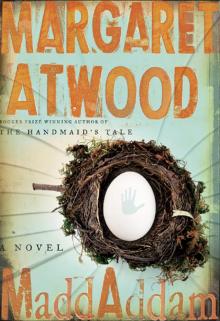 MaddAddam 03 - MaddAddam
MaddAddam 03 - MaddAddam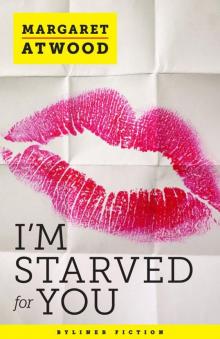 I’m Starved for You (Kindle Single)
I’m Starved for You (Kindle Single) Murder in the Dark
Murder in the Dark In Other Worlds
In Other Worlds Dancing Girls
Dancing Girls Moral Disorder
Moral Disorder